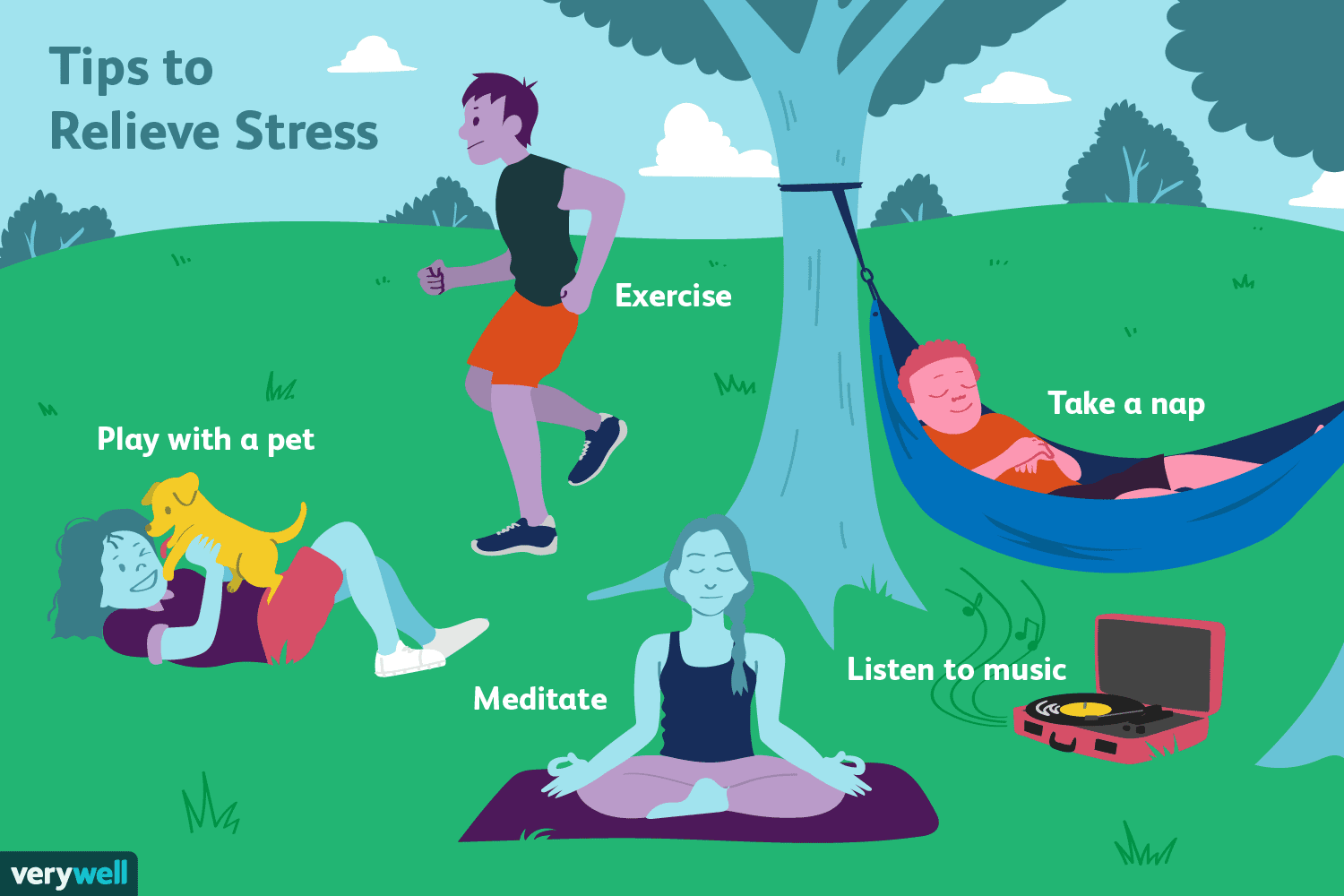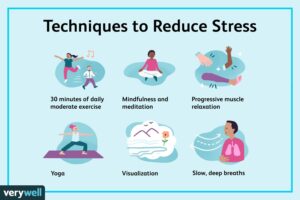Eat well-balanced diet, get enough restful sleep, exercise regularly and meditate are all proven strategies for stress management and can also help build emotional strength and provide you with a support network.
Emergency stress relievers can provide quick solutions when feeling overwhelmed. Try listening to soothing music, taking a walk or writing in your journal as quick fixes.
1. Deep Breathing
People experiencing stress tend to breathe shallowly from their chest rather than from the abdomen, prolonging feelings of stress and increasing tension while making symptoms such as racing heart and tight muscles worse.
Learning to take deep breaths using your diaphragm (muscle beneath your ribcage) can help you unwind from stress-inducing habits and relax, lower heart rate and blood pressure and calm your mind.
To practice diaphragmatic breathing, find a comfortable position and place one hand on your chest and one on your belly. Inhale slowly while counting to four, noting how your hand on your belly rises with each breath. When exhaling slowly notice how your belly moves more than your chest.
2. Yoga
Yoga employs breathing and gentle movements to activate the body’s relaxation response and counteract its “fight or flight” stress response, thus decreasing heart rate, cortisol production, anxiety levels and creating an overall sense of well-being.
Meditation cultivates gratitude, mindfulness and nonjudgmental awareness – qualities essential for living an abundant and peaceful life. With regular practice it can transform one’s perspective from scarcity and lack to abundance and peace.
Peer support is an integral component of mental wellness and can significantly enhance your quality of life (QOL). Sharing experiences or feelings with people who can understand can be a tremendous stress reliever – you can find help online or through local peer support groups.
3. Meditation
Stress is an integral part of life, yet chronic stress can have serious repercussions for both mental health and physical well-being. If you find yourself overwhelmed by it all, consult with a healthcare provider about healthy strategies to cope with stressful situations and create healthier and more resilient habits.
Exercise, diet and a positive outlook are key ways to manage stress effectively. Speaking to a counselor or therapist can also be useful if your coping mechanisms don’t seem to be helping, or your anxiety has reached a new high point.
If you’re new to meditation and would like to try it out, start out slowly by starting with shorter sessions before increasing their length over time. There are various methods of mediation which might work better for you and your lifestyle; choose one that works for you!
4. Exercise
Though it is impossible to avoid all forms of stress entirely, taking steps daily to manage it can make an enormous difference in our daily lives. Everyone’s triggers differ, but some common ways for coping include:
Physical activity can release feel-good endorphins and disperse anxiety-inducing thoughts from your mind. You don’t need a gym workout; even walking to the grocery store or riding your bike through your neighborhood can provide the relief from stress that you need.
Spending time with supportive friends and family is another effective way to reduce stress. If you don’t already have someone close who understands, joining an online or in-person support group could also be helpful. Eating healthily also plays a part in alleviating feelings of tension by maintaining energy levels while clearing your mind. Effective stress management strategies can improve resilience during life’s challenges while helping avoid long-term issues.
5. Yoga Nidra
Yoga Nidra (Yoga Sleep) is an indulging relaxation practice which activates the parasympathetic nervous system to counteract our stress response and promote relaxation, thus relieving anxiety. Studies have also demonstrated its beneficial properties.
One study conducted on participants who practiced yoga nidra demonstrated significant drops in anxiety levels compared to a control group, as well as feelings of positivity, vitality, and well-being among its members.
Yoga Nidra instructors trained to meet specific client needs can modify the script accordingly to address anxiety or depression, changing imagery used and point of focus according to different groups or individuals. They may even help clients discover soothing memories they can use during stressful moments.
6. Journaling
Journaling can be an effective tool for stress management. Journaling allows individuals to focus on their feelings, identify negative self-talk, explore positive coping skills and identify recurring themes or situations which contribute to stress levels – providing an opportunity for proactive changes to take place.
Stresses in life cannot always be avoided, but you can reduce their effect by creating and following healthy habits – like journaling, listening to music, exercising regularly and reading – which help strengthen resiliency. When feeling overwhelmed it’s also helpful to have support networks nearby like trusted friends or mental health professionals; or quick stress relief techniques like counting to 10 or taking a walk when times get rough.
7. Mindfulness
Mindfulness, or becoming aware of your thoughts and emotions in the present moment, is an effective technique for stress reduction. By decreasing cortisol production and soothing a racing mind, mindfulness helps lower cortisol levels significantly and relieve anxiety.
Relaxation techniques such as Yoga, Tai Chi and Qigong offer some relaxation techniques. Focusing on breathing or tuning into one or more senses – seeing, hearing, tasting or smelling something- can also help.
Social contact can be an excellent stress reliever, so set aside some time to see friends and family. Joining in laughter exercises like laughing with others, watching comedy films or participating in laughter yoga are great ways to relieve your tension while increasing energy levels and fighting illness and disease with laughter therapy.




